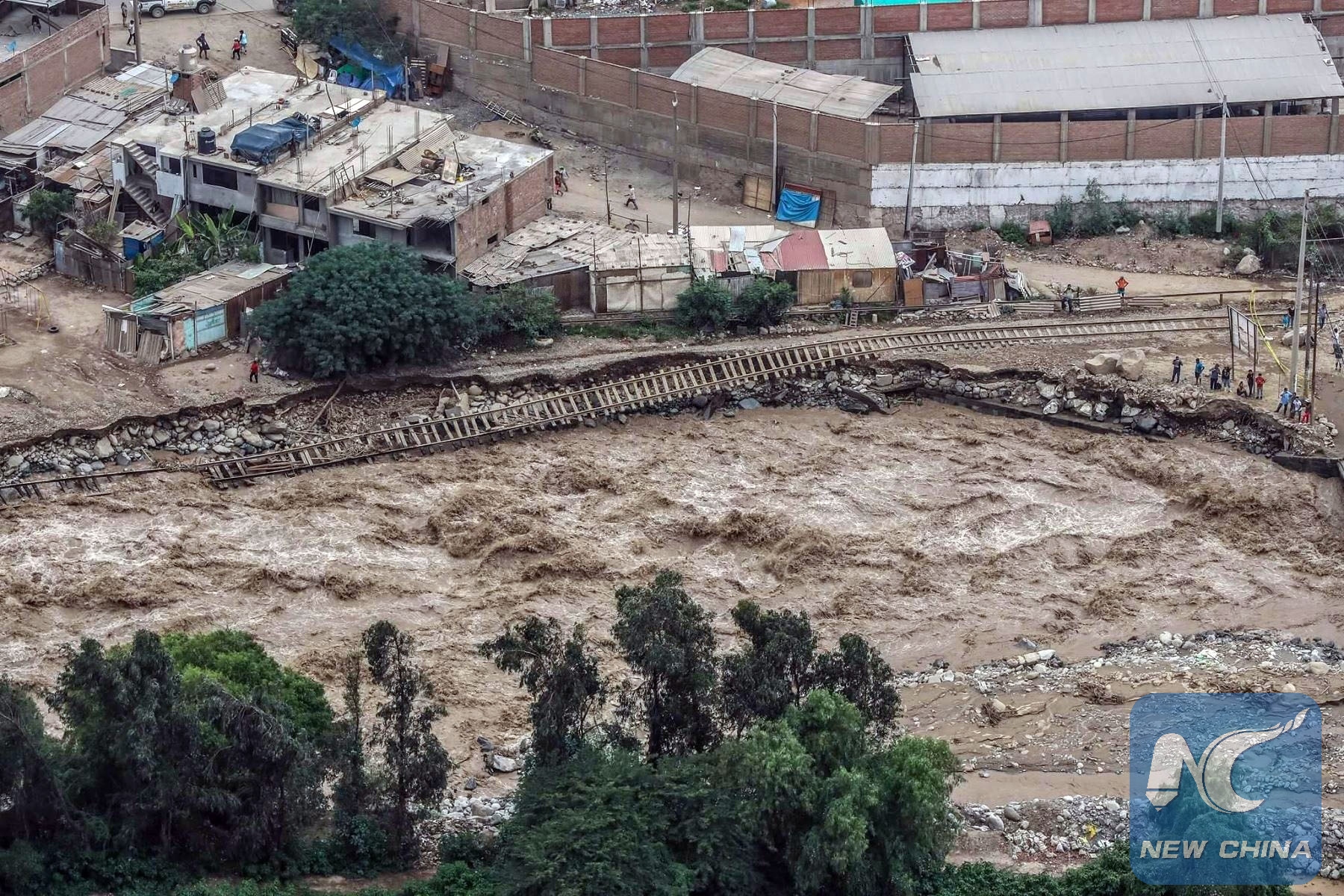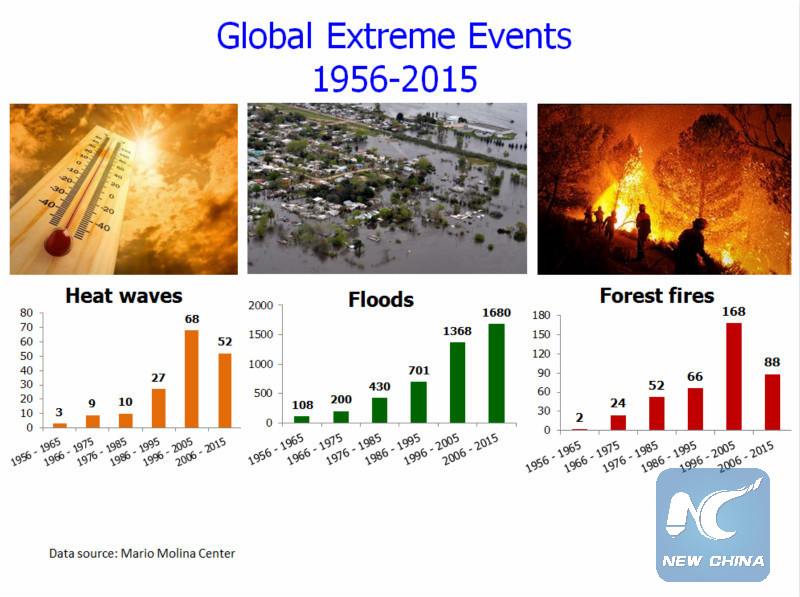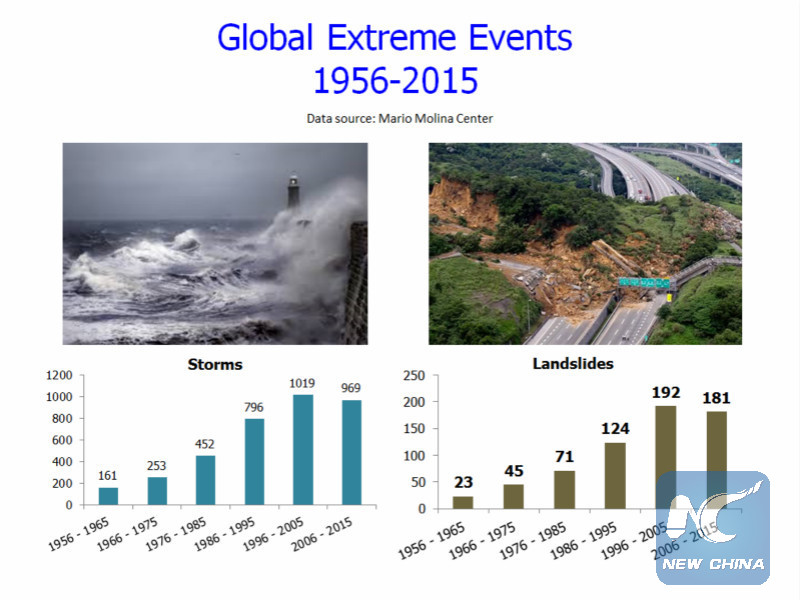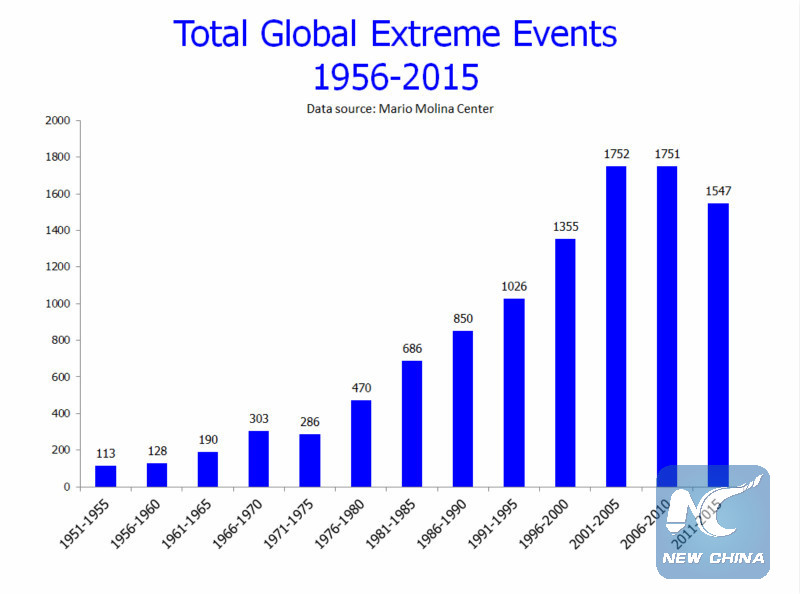
Photo taken on March 18, 2017 shows an aerial view of a flooded area in Lima, Peru. (Xinhua/Prensa Presidencia/ANDINA)
MEXICO CITY, May 8 (Xinhua) -- Extreme weather took its toll on Latin American countries such as Peru, Colombia and Ecuador in 2017, leaving communities struggling to rebuild after devastating floods and landslides destroyed lives, homes and roads.
The disasters have left people wondering whether these are the ravages of climate change, sparked by rising global temperatures, or the vagaries of El Nino, the mischief-making natural weather phenomenon that regularly plagues parts of the world, including South America.
It turns out to be both, and together they can be much more destructive, says Mario J. Molina, winner of the 1995 Nobel Prize in Chemistry for shedding light on the harmful effects of CFCs (chlorofluorocarbons) on the earth's protective ozone layer.
Naturally-occurring El Nino shows up whenever ocean surface temperatures in the eastern-central Pacific become warmer than usual, due to changes in trade winds.
Man-made global warming -- driven mainly by carbon dioxide emissions from burning fossil fuels that trap heat in the atmosphere and cause the so-called greenhouse effect -- can turn El Nino's occasional outbursts into disastrous temper tantrums, the Nobel laureate told Xinhua in a phone interview from his office at the Mario Molina Center for Energy and Environment in Mexico City.
"What is very worrisome is that extreme weather events, such as hurricanes and heavy rains, are now much more common," said Molina, who also serves as a climate policy adviser to Mexican President Enrique Pena Nieto.
After all, some of the additional energy, or heat that the planet is now absorbing, "is going to the oceans" and that is changing "the energy balance of our planet."
"There is no doubt that we have more extreme events, because that can be measured. There are many more natural disasters, such as what recently happened in Peru and Colombia, where many people drowned. They are much more common now than 20, 30 or 50 years ago," he said.
While science may not be able to "tell us that this particular hurricane was caused by climate change, it can tell us that it's very likely that the intensity of that event, which would have occurred anyway, became more extreme due to climate change," he added.



(Data provided by Mario Molina Center)
GLOBAL EFFORTS NECESSARY
Latin America's extensive coastlines and inadequate infrastructure make it particularly vulnerable to extreme weather events, such as hurricanes, but for the most part, regional countries have "barely started to respond" to the threats of climate change, notes Molina.
However, the United Nations-led Paris Agreement, a legally-binding pact to cut greenhouse gas emissions and curb global warming, is helping to influence policy around the world.
"Through the United Nations Paris Agreement, most Latin American countries, including Mexico, have a commitment to start reducing emissions. Many of them have started," said Molina, noting the wind farms that Argentina is building, and the solar and wind energy plans that Mexico is making.
Though the Paris Agreement has been instrumental in spearheading collective climate change action, one important signatory may withdraw, as U.S. President Donald Trump questions the existence of global warming.
That's not a good thing, concedes Molina, especially since as a leading global economy, and a leading global polluter, the United States should bear its share of the burden.
"In my opinion, it is highly irresponsible for the U.S. government, under Donald Trump or his EPA (Environmental Protection Agency) chief (Scott) Pruitt, not to take into account climate change, because the scientific evidence is enormous and the risk is very large. That amount of ignorance is a big danger for the planet. There is nothing that justifies it," the expert said.
In addition, "if the United States, being one of the largest or richest economies, doesn't take action, then it is unfair, because it is like taking advantage of the others," he added.
But the damage from an absent U.S. leadership should be limited in scope, given that there are many other public- and private-sector players, Molina believes.
"What's happening is that many states, like California, Massachusetts, and so on, are taking action already, in spite of President Trump, as are many companies and many cities, like New York and certainly in California. So there is a counter response," he said.
COST OF INACTION TOO HIGH
There is widespread consensus among the international scientific community over the link between industrial activity and global warming, not to mention mounting physical evidence, in melting polar ice caps and rising sea levels, yet climate change skeptics continue to ignore the proof.
According to Molina, climate change denial has traditionally been driven by two motives: profit or ignorance.
People connected to the fossil fuel industry may deny climate change, because "they were worried that they would lose resources and money if climate change regulations were implemented."
Other reasons of denial may be influenced by religion, superstition or politics. "Science is based on evidence, not beliefs. The amount of evidence of climate change, as well as evolution, is gigantic," Molina said.
Cost may also be a consideration, though the price of acting now is likely to offset the expense of doing nothing.
"Some of the deniers think that anything we do to protect the planet is so expensive that we shouldn't even consider it. That's a very bad mistake, because we now know that renewable energies, such as solar, wind and so on, are competitive. They are no longer more expensive than fossil fuels," said Molina.
He believes that taking action to tackle climate change does not incur economic loss. On the contrary, "you can create more jobs, you can continue to benefit all of society" by promoting alternative fuels and sustainable technologies, he said.
"It's very clear to the experts, including economists, that it is much more expensive not to do anything about climate change."
For now, measures like the Paris Agreement can promote global cooperation and drive action. The agreement allows countries to set their own emissions targets, but also calls for measuring that progress to hold countries accountable, Molina noted.
It also encourages the transfer of technology, and to that end, China has made its own significant contribution, he said.
"One very good example are solar panels in China. They were developed to such an extent that their price came down substantially, and that benefits not only China, but also the entire planet," the expert said.

